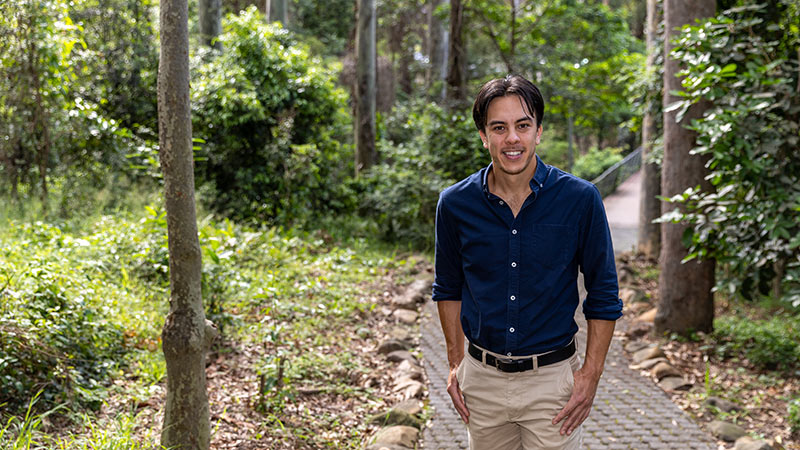Building disaster resilience by pushing a proactive approach
Dr Thomas Cooper-Johnson
Disaster management is crucial in Asia and the Pacific—a region with high natural hazards and social and economic challenges. Through his research, Dr Thomas Cooper-Johnson is working to mitigate this risk and issues and improve outcomes.

Thomas’ research is focused on building disaster resilience, particularly for vulnerable groups like refugees and internally displaced populations.
He studies how to make humanitarian aid more effective in proactively reducing disaster risks, even amidst challenges like government restrictions, donor influence, and political conflicts.
He also explores disaster waste management and ways to involve local communities in aid efforts, ensuring that support is sustainable and culturally appropriate.
Tackling human drivers of disaster risk
“One of the key challenges of my work is changing the perception thatdisasters are 'natural' events by highlighting the significant human factors that influence disaster risk and impact”, shares Thomas.
“I focus on how urbanisation, environmental degradation, and inadequate infrastructure increase vulnerability, especially for refugees and internally displaced people.
Additionally, I address broader issues within the humanitarian aid model, which often struggles with coordination, sustainability, and cultural appropriateness.”
By promoting community involvement and developing more effective aid strategies, his goal is to create a resilient system that tackles the human drivers of disaster risk and helps vulnerable populations reduce their risk.
On the ground in South Asia
Thomas’ academic credentials include a Doctor of Philosophy in Disaster Management, a Bachelor of Construction Management and a Master of Disaster Preparedness & Reconstruction, all from the University of Newcastle.
He became an associate lecturer in the School of Architecture and the Built Environment while completing his PhD.
Thomas got involved in this field of research as a result of his undergraduate and PhD work with non-government organisations (NGOs) in South Asia.
This included working in Myanmar and also in Bangladesh where he partnered with Save the Children to facilitate the fieldwork in understanding the long-term impacts of humanitarian projects on reducing disaster risks.
During this time, he witnessed firsthand the profound challenges faced by refugees and internally displaced people.
“Working on the ground in these regions exposed me to the urgent need for effective disaster resilience strategies. I saw how political conflicts and government restrictions often hindered the delivery of humanitarian aid, and I was inspired to find ways to overcome these obstacles.”
Investing in disaster risk reduction
As well as governments restricting the delivery of aid, Thomas also explains that often government investment in disaster management is predominantly directed towards recovery and reconstruction after a disaster has occurred rather than focusing on proactive disaster risk reduction.
The typical approach emphasises repairing damage and rebuilding infrastructure, which, while necessary, doesn’t address the underlying vulnerabilities that contribute to the severity of disasters. There needs to be more emphasis on the value of investing in disaster risk reduction (DRR).
“Studies have shown that every dollar invested in disaster risk reduction can save between $4 to $10 in disaster response and recovery costs”, says Thomas.
“Moreover, focusing on DRR helps build resilience in communities, making them better prepared to withstand and recover from disasters.”
This reduces the long-term socio-economic impacts, such as displacement, loss of livelihoods, and psychological trauma, which can persist long after the immediate recovery phase is over.
Global and local impact
In addition to his research work in South Asia, which has informed humanitarian projects and helped to reduce long-term risks by addressing root causes of disaster vulnerability, Thomas has also worked in Australia and the surrounding regions.
He collaborated with the Secretariat of the Pacific Environmental Programme (SPREP) to facilitate training programs on disaster waste management—programs that have improved health and sanitation for local populations during crises, reducing the potential for disease and improving overall wellbeing.
Close to home, he’s also worked alongside volunteer agencies such as the Rural Fire Services and the State Emergency Service and in collaboration with local councils in the region, enhancing understanding and management of flood risks.
Overall, by researching disaster risks within Australia and surrounding regions, his work has led to enhanced community safety and resilience.
“Economically, my research promotes more cost-effective disaster management by emphasising proactive risk reduction over-reactive recovery. This shift not only saves money but also protects economic assets and livelihoods from being destroyed by disasters”, explains Thomas.
“Socially, involving local communities in disaster preparedness and response fosters a sense of ownership and empowerment, strengthening social cohesion and trust in humanitarian efforts.”
Research that’s building resilience
Helping vulnerable populations become more resilient to disasters is something Thomas finds incredibly rewarding.
He sees it as being about creating a safer future where people are not just reacting to disasters but are prepared and equipped to handle them proactively.
“The aspect of my research I find most motivating is its holistic approach. By addressing the root causes of disaster vulnerability—such as poor infrastructure, environmental degradation, and lack of community involvement—we’re building a foundation for long-term resilience.”
This approach doesn't just provide immediate relief. It fosters sustainable development and empowers communities to withstand future challenges better.
Thomas’ authored work has appeared in and been cited in several academic journals. He’s also been published in The Conversation, the world's leading publisher of research-based news and analysis.
In addition to his own research work, he’s now working with the next generation of academics, supervising honours and PhD students in a variety of disaster risk reduction topics.
The University of Newcastle acknowledges the traditional custodians of the lands within our footprint areas: Awabakal, Darkinjung, Biripai, Worimi, Wonnarua, and Eora Nations. We also pay respect to the wisdom of our Elders past and present.
